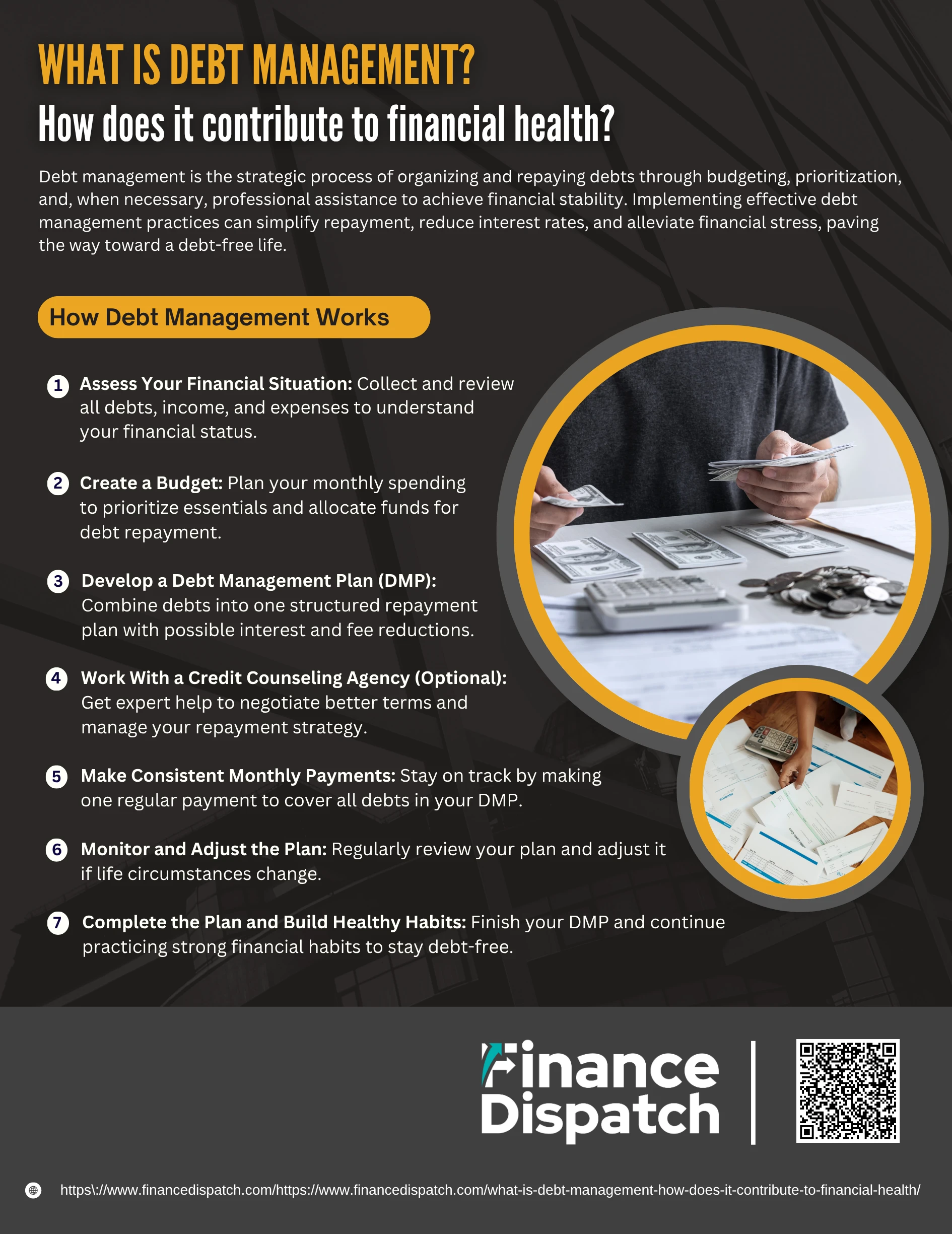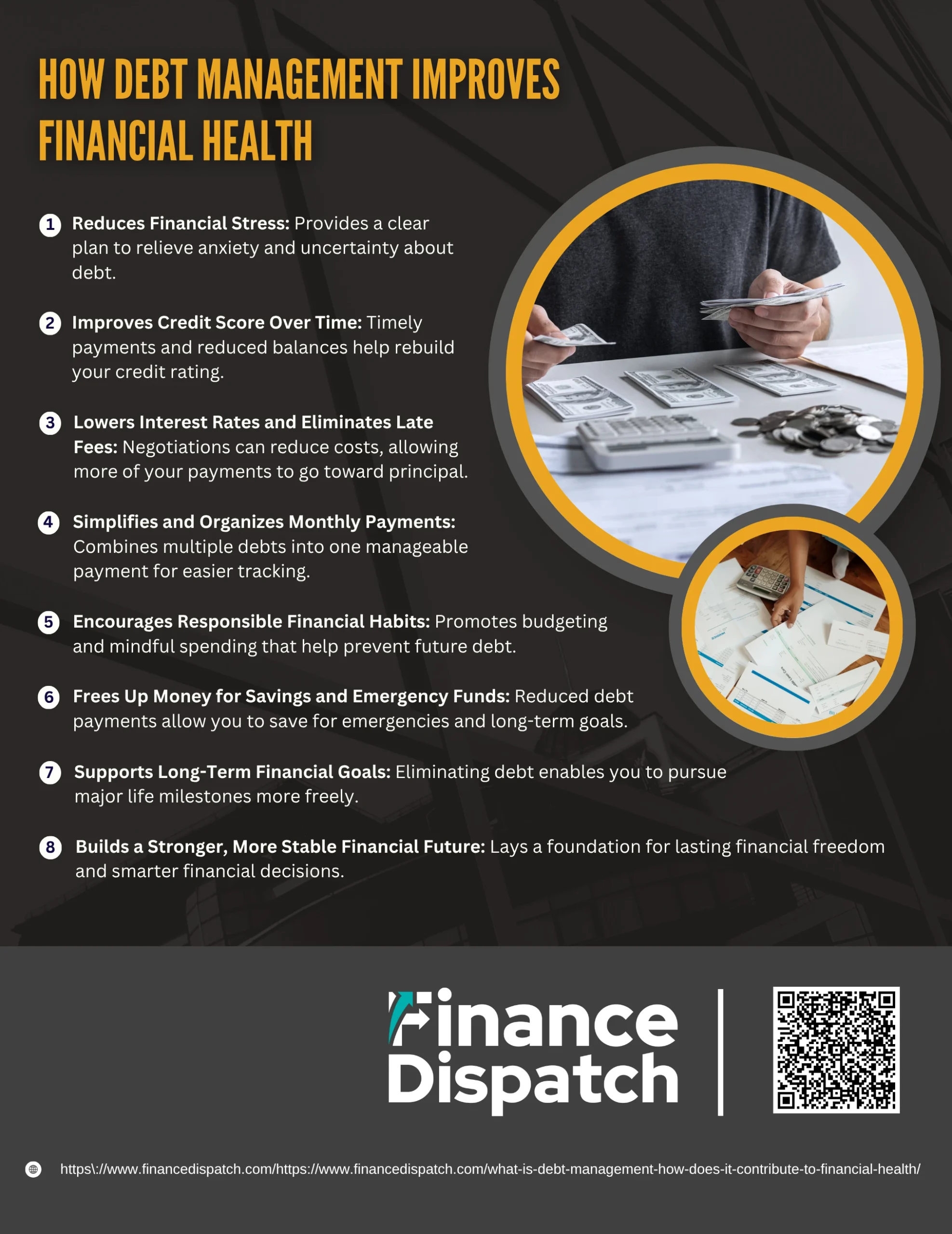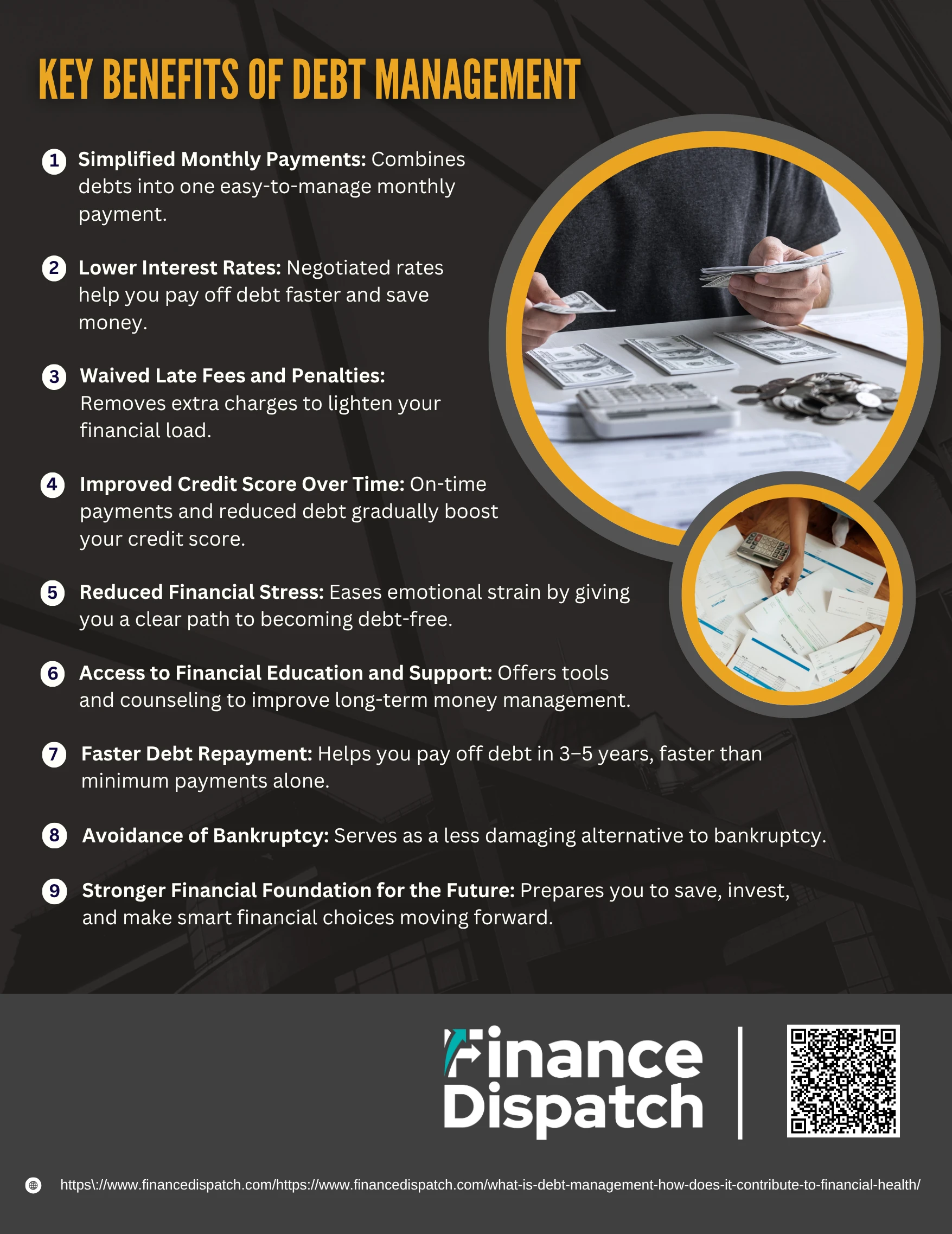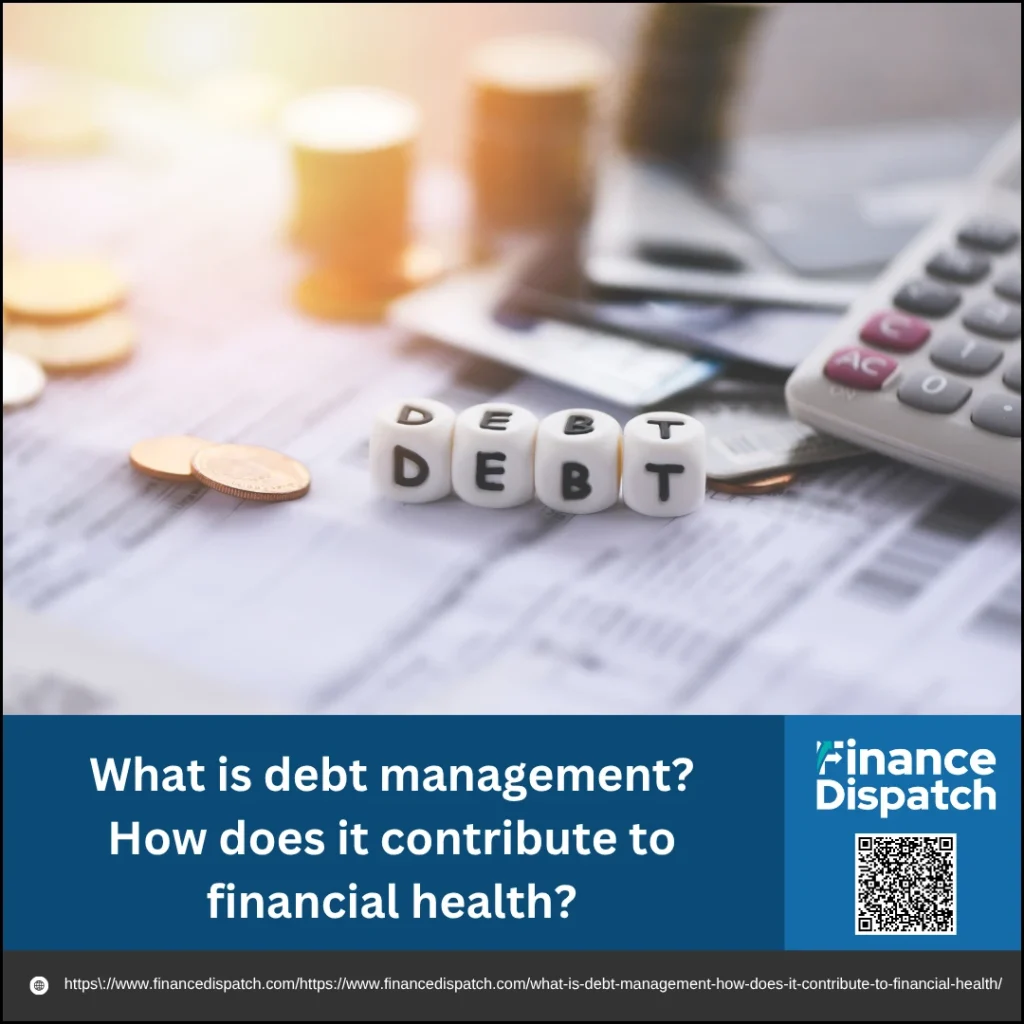In today’s complex financial landscape, managing debt is more than a necessity—it’s a pathway to stability and peace of mind. Whether you’re dealing with student loans, credit card balances, or personal loans, how you handle your debt can significantly impact your overall financial well-being. Debt management is not about avoiding debt altogether but about strategically organizing repayments to maintain control and avoid financial pitfalls. By understanding and applying effective debt management practices, individuals can reduce stress, protect their credit score, and lay the foundation for a healthier, more secure financial future.
What is Debt Management?
Debt management is a strategic approach to organizing and repaying your debts in a way that reduces financial stress and supports long-term stability. It involves assessing your current financial obligations—such as credit card balances, personal loans, or medical bills—and creating a plan to pay them off systematically. This can be done independently through budgeting and payment prioritization or with the help of credit counseling agencies that negotiate lower interest rates and consolidate payments into one manageable monthly amount. The ultimate goal of debt management is not just to eliminate debt but to regain control over your finances and build habits that prevent future debt accumulation.
Types of Debt and Their Impact
Not all debt is created equal. Some types of debt, like student loans or home mortgages, can serve as investments in your future and help build long-term wealth. Others, such as high-interest credit card debt or payday loans, can quickly spiral out of control and harm your financial stability. Understanding the differences between various types of debt—and how they influence your financial health—is essential for making informed decisions and managing your obligations effectively.
| Type of Debt | Description | Impact on Financial Health |
| Good Debt | Debt used to invest in appreciating assets like education, business, or property. | Can increase net worth, improve income potential, and support financial goals. |
| Bad Debt | Debt incurred for depreciating items like luxury goods, cars, or vacations. | Leads to high-interest payments, financial strain, and reduced savings. |
| Secured Debt | Debt backed by collateral (e.g., mortgage, auto loan). | Often comes with lower interest but risks asset loss if unpaid. |
| Unsecured Debt | Debt not tied to assets (e.g., credit cards, personal loans). | Usually higher interest; may affect credit score if mismanaged. |
| Revolving Debt | Credit lines that allow repeated borrowing (e.g., credit cards). | Flexible but risky if balances aren’t paid off monthly. |
| Installment Debt | Loans repaid in fixed payments over time (e.g., student loans). | Predictable repayment structure; can support financial planning. |
 How Debt Management Works
How Debt Management Works
Debt management is a practical and organized method for regaining financial control, especially when multiple debts feel overwhelming. It aims to simplify repayment, reduce overall interest costs, and help individuals become debt-free in a structured and achievable way. Rather than letting high-interest loans and missed payments spiral into financial stress, debt management brings clarity and structure to your financial life. Whether you handle it independently or through a professional credit counseling agency, the process follows a step-by-step approach to address debt responsibly and sustainably.
Here’s how debt management typically works:
1. Assess Your Financial Situation
Start by gathering all your financial information—list your outstanding debts, minimum payments, interest rates, and due dates. Also calculate your total monthly income and fixed expenses. This financial snapshot helps identify how deep your debt is and what resources you have to address it.
2. Create a Budget
With a clear understanding of your financial picture, create a monthly budget that allocates funds for essential living costs and debt repayment. This step ensures that you live within your means and avoid accumulating new debt while paying down existing obligations.
3. Develop a Debt Management Plan (DMP)
A DMP is a structured repayment strategy that combines multiple debts into one monthly payment. This plan typically focuses on unsecured debts, like credit cards or personal loans, and can include negotiated lower interest rates, reduced fees, and a realistic timeline for repayment—usually within 3 to 5 years.
4. Work With a Credit Counseling Agency (Optional)
If you need guidance or prefer not to manage it alone, a certified credit counselor can help. They analyze your finances, communicate with creditors, and design a custom DMP for you. They may also negotiate on your behalf to lower interest rates or stop collection efforts, making your repayment journey more manageable.
5. Make Consistent Monthly Payments
Once the DMP is in place, make a single monthly payment—either directly to your creditors or through the counseling agency, which distributes the funds. Timely payments are critical to keep the plan on track and maintain any concessions granted by creditors.
6. Monitor and Adjust the Plan
Life is unpredictable—job changes, emergencies, or other financial shifts can impact your ability to follow the plan. Regularly review your budget and communicate with your counselor if adjustments are needed. Flexibility is key to long-term success.
7. Complete the Plan and Build Healthy Habits
Reaching the end of a DMP is a major achievement. Beyond becoming debt-free, the process also helps you build strong financial habits—like budgeting, saving, and mindful spending—that support long-term financial health. These skills help ensure you stay out of debt and continue moving toward your financial goals.
 How Debt Management Improves Financial Health
How Debt Management Improves Financial Health
Debt can silently erode your financial confidence, drain your income through interest payments, and prevent you from achieving important life goals. However, a structured approach like debt management doesn’t just help you pay off what you owe—it transforms the way you manage money. By creating a realistic plan, reducing your financial burden, and encouraging better habits, debt management can significantly enhance your financial well-being. It’s not only about escaping debt, but also about gaining control, restoring balance, and building a future where your money works for you—not against you. Here’s how debt management improves your financial health:
1. Reduces Financial Stress
Constantly worrying about missed payments, rising interest, or dealing with creditor calls can take a toll on your mental and emotional health. Debt management provides structure and clarity, reducing uncertainty and anxiety by showing you a clear, step-by-step path to becoming debt-free.
2. Improves Credit Score Over Time
A major part of your credit score is based on payment history and credit utilization. By consolidating debts and ensuring timely payments each month, you show creditors that you’re reliable. Over time, this consistency helps rebuild and strengthen your credit profile.
3. Lowers Interest Rates and Eliminates Late Fees
Credit counseling agencies can often negotiate with your creditors to lower your interest rates and remove penalties. This helps reduce the total amount you owe, allowing more of your payments to go toward the principal rather than being eaten up by interest.
4. Simplifies and Organizes Monthly Payments
Managing several debts with different due dates, amounts, and lenders can be overwhelming. A debt management plan consolidates your payments into one monthly obligation—making it easier to track, budget, and avoid missed or late payments that can negatively affect your credit.
5. Encourages Responsible Financial Habits
One of the hidden strengths of debt management is education. Through budgeting, financial counseling, and tracking spending, you learn how to make smarter money decisions. These habits not only keep you out of debt but also empower you to handle future challenges with confidence.
6. Frees Up Money for Savings and Emergency Funds
Once your debt is under control, you’ll likely find you have more financial breathing room. Instead of spending hundreds on interest charges, you can use that money to build an emergency fund, start saving for retirement, or plan for life goals like a home, travel, or education.
7. Supports Long-Term Financial Goals
Debt can hold you back from achieving milestones—like buying a house, starting a business, or investing. By eliminating debt, you unlock your ability to pursue these goals without being weighed down by financial obligations or high-interest payments.
8. Builds a Stronger, More Stable Financial Future
Perhaps the most lasting benefit of debt management is that it sets the stage for lasting financial freedom. You not only eliminate past mistakes but also lay the groundwork for a future rooted in stability, savings, and smarter decision-making.
 Key Benefits of Debt Management
Key Benefits of Debt Management
Debt can quietly take over your life, impacting not just your bank account but also your peace of mind and future goals. That’s where debt management comes in—a structured, proactive approach to tackling debt in a way that’s both manageable and sustainable. Whether you choose to work with a credit counseling agency or take a disciplined DIY route, a well-designed debt management plan (DMP) helps you regain control over your finances. It doesn’t just help you eliminate what you owe; it also strengthens your credit, builds better financial habits, and brings you closer to long-term financial freedom. Here are the key benefits that make debt management a powerful financial tool:
1. Simplified Monthly Payments
Managing several credit card bills or loans with different due dates and amounts can be overwhelming. Debt management combines these into a single, easy-to-track monthly payment, making your finances more organized and less stressful.
2. Lower Interest Rates
One of the biggest advantages of enrolling in a DMP is the possibility of negotiating lower interest rates. This means more of your payment goes toward reducing the principal balance, helping you pay off your debt faster and saving you hundreds—or even thousands—of dollars over time.
3. Waived Late Fees and Penalties
Credit counselors often work with creditors to eliminate late fees and stop ongoing penalties. This provides a much-needed reset and reduces the overall burden on your finances, especially if you’ve fallen behind on payments.
4. Improved Credit Score Over Time
Although entering a DMP may initially cause a slight dip in your credit score, consistent on-time payments and reduced debt balances can help improve it in the long run. A stronger credit score opens doors to better loan terms, lower insurance rates, and even job opportunities.
5. Reduced Financial Stress
Constant calls from creditors and the fear of not making ends meet can be emotionally draining. Debt management relieves this stress by giving you a clear, step-by-step plan and the confidence that you’re making progress toward becoming debt-free.
6. Access to Financial Education and Support
Most debt management programs include personalized counseling and educational tools that teach you how to budget, save, and avoid future debt. These skills are invaluable for maintaining financial stability long after your debts are paid off.
7. Faster Debt Repayment
When interest rates are reduced and fees are waived, your payments work harder for you. Debt management programs often result in a shorter repayment timeline—typically between three and five years—compared to making minimum payments indefinitely.
8. Avoidance of Bankruptcy
For many, debt management serves as a viable alternative to bankruptcy. It allows you to settle your debts in full, preserve your financial reputation, and avoid the long-term consequences that bankruptcy can have on your credit and future borrowing ability.
9. Stronger Financial Foundation for the Future
Completing a DMP doesn’t just mean you’re debt-free—it means you’re financially wiser, more disciplined, and better equipped to make smart money decisions. This foundation helps you build savings, invest in your future, and avoid falling back into debt.
Challenges and Limitations of Debt Management
While debt management offers a practical pathway toward financial stability, it’s not a one-size-fits-all solution. Like any financial strategy, it comes with its own set of challenges and limitations that individuals must consider before committing. Understanding these drawbacks helps set realistic expectations and ensures you’re choosing the right approach for your situation. Below are the most common obstacles people face when using a debt management plan (DMP) or similar strategies:
1. Limited to Unsecured Debt
Debt management plans typically only cover unsecured debts like credit cards and personal loans. Secured debts—such as mortgages, car loans, or student loans—are usually excluded from DMPs.
2. Requires Long-Term Commitment
A typical DMP lasts 3 to 5 years. Maintaining consistent monthly payments over that time requires discipline, and missing payments could cause creditors to revoke negotiated terms.
3. Possible Initial Credit Score Dip
Enrolling in a DMP may result in a temporary drop in your credit score due to account closures or changes in credit utilization, even though your score may improve over time.
4. Restrictions on New Credit Use
During the program, you’ll often be required to stop using existing credit cards and avoid opening new lines of credit, which can feel limiting if unexpected expenses arise.
5. Upfront and Monthly Fees
Although nonprofit agencies usually keep costs low, many still charge a setup fee and ongoing monthly service fees, which can be a financial strain for some participants.
6. Not All Creditors Participate
Some creditors may refuse to work with credit counseling agencies, meaning certain debts may remain outside the scope of your DMP.
7. Lack of Flexibility
Once a DMP is in place, it may be difficult to adjust if your income drops or unexpected expenses occur, making the plan harder to maintain.
8. Impact on Credit Access
Closing credit accounts as part of the plan can reduce your available credit and length of credit history, both of which can negatively influence your credit score.
Debt Management vs. Other Financial Strategies
When it comes to tackling debt, there’s no universal solution. Debt management is just one of several strategies available to individuals looking to regain financial stability. Depending on your financial goals, income, and debt type, other options—such as debt consolidation, debt settlement, or bankruptcy—may also be worth considering. Each method comes with unique benefits, risks, and impacts on your credit and long-term financial health. Understanding how debt management compares to these alternatives can help you choose the most effective path forward.
| Strategy | Definition | Key Benefits | Key Drawbacks | Best Suited For |
| Debt Management | A structured repayment plan through a credit counseling agency | Simplified payments, lower interest, improved financial habits | Requires time, discipline, and may involve credit account closures | Those with regular income and high unsecured debt |
| Debt Consolidation | Combining multiple debts into one loan with a lower interest rate | One monthly payment, potential interest savings | Requires good credit to qualify; risk of taking on new debt | Individuals with manageable debt and fair to good credit |
| Debt Settlement | Negotiating to pay less than the full amount owed | Can significantly reduce debt amount | Harms credit, potential tax consequences, not all creditors agree | Those with severe financial hardship and inability to repay debt |
| Bankruptcy | Legal process to discharge or restructure debts | Can eliminate most debts and provide a financial reset | Severe credit damage, legal costs, long-term credit impact | Individuals with overwhelming debt and no repayment ability |
| DIY Budgeting & Repayment | Self-managed strategy using personal budget and repayment tactics | No fees, maintains full control, builds discipline | Requires strong self-discipline, no creditor negotiation | Those with small to moderate debt and strong budgeting skills |
How Debt Management Affects Your Credit Score
Debt management can influence your credit score in both positive and negative ways, depending on how the plan is executed and maintained. Initially, enrolling in a debt management plan (DMP) might cause a slight dip in your score—especially if you’re required to close existing credit card accounts, which can reduce your available credit and affect your credit utilization ratio. Some creditors may also note on your credit report that you’re participating in a DMP, which future lenders could view as a sign of financial hardship. However, the long-term effects are generally positive. As you consistently make on-time payments through the plan and reduce your outstanding debt balances, your payment history and credit utilization improve—two major factors in your credit score. Over time, this responsible behavior can help rebuild your credit and demonstrate to lenders that you’re actively managing your finances.
Helpful Tools and Resources for Debt Management
Successfully managing debt requires more than just determination—it also involves using the right tools and resources to stay organized, make informed decisions, and track your progress. Whether you’re handling your debts on your own or working with a credit counselor, these tools can simplify budgeting, payment tracking, and long-term planning. Leveraging these resources can empower you to take control of your finances and stay on the path toward becoming debt-free.
1. Budget Calculators
These tools help you evaluate your income, expenses, and savings to create a realistic monthly budget that prioritizes debt repayment.
2. Debt Repayment Calculators
Use these to estimate how long it will take to pay off your debt based on interest rates and monthly payments. They can also compare methods like the snowball and avalanche strategies.
3. Credit Counseling Agencies
Certified nonprofit organizations offer personalized financial advice, help create debt management plans, and negotiate with creditors on your behalf.
4. Mobile Budgeting Apps
Apps like Mint, YNAB (You Need A Budget), and EveryDollar let you monitor your spending in real time, set financial goals, and stay accountable.
5. Spending Trackers
Simple tools or apps that categorize and log daily expenses so you can identify unnecessary spending and redirect funds toward debt repayment.
6. Online Financial Education Resources
Many organizations offer free webinars, articles, and courses that teach you how to manage money, build credit, and avoid future debt.
7. Credit Report Monitoring Services
Regularly reviewing your credit report helps you track progress, catch errors, and see how debt repayment affects your credit over time.
8. Support Groups and Forums
Online communities and local groups provide emotional support, practical tips, and shared experiences to keep you motivated throughout your journey.
Long-Term Impact on Financial Stability
Debt management does more than help you eliminate what you owe—it builds a foundation for lasting financial stability. By establishing consistent repayment habits, reducing interest costs, and improving creditworthiness, you create a healthier financial outlook for the future. Over time, managing debt responsibly can increase your access to better credit terms, enable long-term savings, and reduce financial stress. It also encourages disciplined budgeting and smart financial decision-making, which are critical for achieving goals like home ownership, retirement planning, or emergency preparedness. In essence, effective debt management is not just a solution to current financial strain—it’s a strategy for long-term security and peace of mind.
Conclusion
Debt management is a powerful financial strategy that helps you take control of your finances, reduce stress, and work toward a debt-free future. By consolidating payments, lowering interest rates, and promoting disciplined budgeting, it provides both immediate relief and long-term benefits. While it comes with certain challenges, the advantages often outweigh the drawbacks—especially when paired with the right tools, guidance, and commitment. Whether you’re just beginning your journey or looking to regain balance, effective debt management can pave the way to greater financial health, stability, and freedom.



